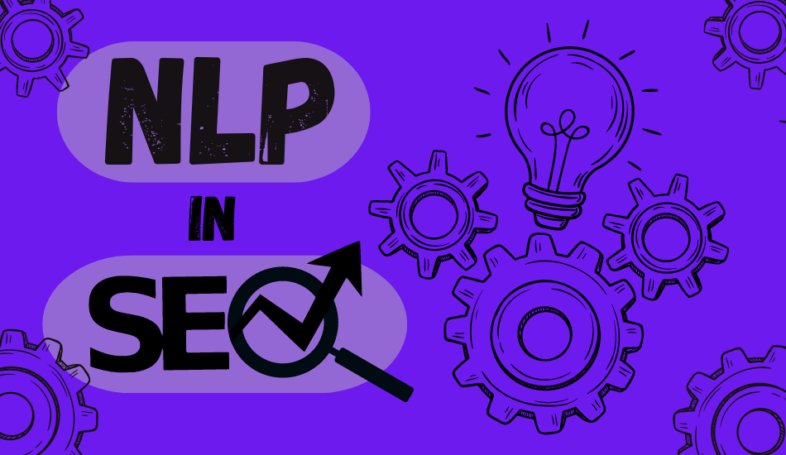NLP In SEO – Let Me Guide You Through What I’ve Learned!
Welcome my readers and friends! Here’s what I learned in the last few weeks about NLP in SEO. Now let’s step into the world where words meet the web!
If you’re a business or website owner eyeing the top spots on search engines, the link between Natural Language Processing (NLP) in SEO is your secret weapon. This guide is your map through the maze of On-Page SEO, machine smarts and the game changing BERT algorithm. Dive into the SEO tactics playbook, unraveling user experience, decoding trends and mastering structured data for a smarter strategy.
No jargon, just results. Explore the language of search engines with insights on semantic search and the BERT impact on search queries. Get ready to amp up your online game, armed with practical tips. This isn’t your typical SEO journey, it’s decoding NLP in SEO to make your content the king of the digital jungle.
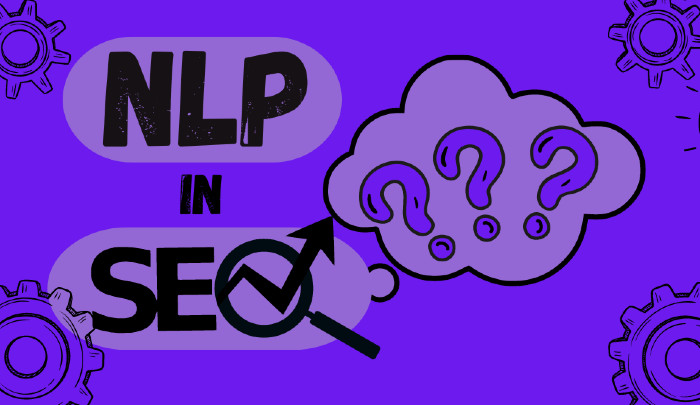
Why Should You Care About NLP In SEO?
In the vast world of SEO, Natural Language Processing isn’t just a buzzword. It’s your secret sauce for pushing your website higher in search engines. Let’s break it down without the jargon. NLP is like giving brains to search engines, teaching them to understand how we talk and what we mean.
Imagine this: you’re chatting with a friend, and they get what you mean, not just the words you say. NLP does the same for search engines. It goes beyond keywords, diving into the actual language people use online. When you get this, your website becomes the friendly chatter that search engines love.
On-Page SEO, the stuff you do on your website, meets NLP like peanut butter meets jelly. NLP helps search engines read your content like a human, understanding context and making sense of it all. It’s the magic wand that turns your web content into a language that search engines adore.
The BERT Marvel: A New Era in Understanding
Enter BERT, the superhero in our SEO story. BERT is like the upgraded brain of search engines, introduced by Google. It’s all about understanding the context of words in a sentence. So, when people type in those search queries, BERT makes sure your content matches what they’re really looking for.
The Takeaway
NLP isn’t a tech puzzle; it’s your passport to SEO success. Keep it simple, speak the language of your audience, and let it be your website’s friendly translator in the vast digital world. Up next, we’ll go through the impact of NLP on your SEO strategy. Your guide to ruling the online kingdom!
But just a side note: In case you don’t want to put forth the extra effort, you always can find ways to bypass all this. Learn how to get more leads and traffic without SEO today!
Google’s Adoption of NLP: BERT Algorithm
Let’s dive into the tech evolution that changed the SEO game. Google’s BERT Algorithm! Imagine it as the cool upgrade that made Google understand your queries like a helpful friend, not a robot.
Introduced in 2019, BERT (Bidirectional Encoder Representations from Transformers) isn’t just a techy term. It’s Google’s way of reading between the lines. Before BERT, Google might get tangled in words, but now it gets the vibe, the context, the real stuff.
Why does this matter? Well, think of your search queries as a conversation with Google. With BERT, Google doesn’t just fetch words; it understands the meaning behind them. So, when you ask a question or type a phrase, BERT ensures you get what you’re actually looking for. Not just a bunch of random results!
Quality Content and Context: BERT’s Favorites
BERT is a fan of quality content. It loves when your webpage isn’t just throwing keywords around but actually answering questions and providing helpful info. The more you focus on what your audience wants, the more BERT nods in approval.
Expert Opinions on Google’s NLP Approach: Real Talk
But don’t just take my word for it. SEO experts are singing praises for BERT. It’s like having a sophisticated language coach for your website, ensuring it speaks the same language as your audience.
In a nutshell, Google’s adoption of NLP through BERT is a game changer. It’s like turning Google into your savvy friend who gets you, understands your quirks, and always directs you to what you need. Next up, let’s explore how this friendly tech giant impacts your SEO strategy.
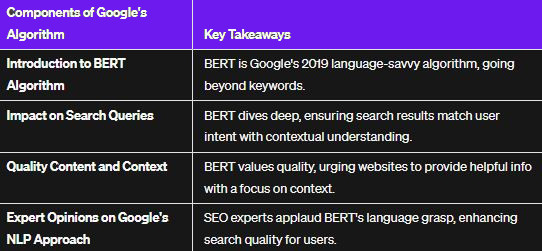
NLP’s Impact On SEO Strategy
Alright, buckle up for the SEO strategy ride. Natural Language Processing (NLP) is not just a tech wizardry. It’s your golden ticket to master the ever evolving SEO game!
Integration of NLP in Evolving SEO Methods
SEO isn’t about sprinkling keywords like confetti anymore. Enter NLP, it’s the friend who understands what your audience really wants. To ace this, you need to really weave it into your SEO methods. Think of it as upgrading from a basic map to GPS. Precision absolutely matters!
Proactive Approach to Adapt SEO Tactics
In this digital jungle, being reactive won’t cut it. NLP nudges you to be proactive. It’s not about predicting the future but about staying ahead. Keep an eye on the NLP trends, adapt your SEO tactics and voila, you’re not chasing the algorithm. You’re riding its wave.
Significance of Understanding User Experience, Marketing Trends, and Structured Data
NLP spills the tea on what users want. It’s your backstage pass to understanding their experience. Check what’s trending in the marketing world; NLP loves that. Oh, and structured data? It’s like giving the red carpet treatment. It makes everything more organized and attractive.
Remember the BERT superhero we talked about? Well, he loves quality keywords. Be sure to dive deep into your keyword pool. Don’t just skim, understand the intent behind each search. It’s not just about what they type, it’s about what they seek.
NLP’s Impact on Link Structure and Placement
Links are like the bridges on the internet highway. NLP is the traffic controller. Ensure your links make sense, guide users logically and connect to meaningful destinations. NLP appreciates well placed signposts, your users will too!
Spying on competitors? I say, just go for it but do it smartly. Analyze their content through the NLP lens. What language are they using? How’s their engagement? Borrow the good stuff and make it your own.
Mastering natural language in your SEO strategy isn’t rocket science, it’s more like learning the cool dance moves everyone loves. Stay tuned as we’re just getting started on this NLP in SEO guide.
Understanding BERT In SEO
Alright, let’s demystify the BERT buzz in SEO land. Imagine BERT as your savvy sidekick, enhancing Google’s brainpower and consequently, your SEO game.
Components of Google’s Algorithm: Methodology and Data
First things first, Google’s algorithm is like the wizard behind the curtain. BERT, introduced in 2019, is its cool upgrade. It doesn’t just look at words, it looks into the whole sentence, understanding the flow and meaning. It’s like upgrading from a black and white TV to a 4K screen, clarity matters.
How does BERT work its magic? Picture it like a language detective. BERT collects data, studies how we use words, and then analyzes it using Natural Language Processing (NLP). It’s not just about finding keywords, it’s about grasping the context and intent behind them.
Importance of Researching High-Ranking Pages for Optimization
Ever wondered why certain pages top the charts? BERT is the secret sauce. Research those high ranking pages, see how they talk and what questions they answer. BERT loves pages that provide real value, not just keyword stuffed fluff.
In the BERT world, it’s not about playing hide and seek with keywords, it’s about genuinely understanding what users want. Optimizing your content becomes a thoughtful conversation with your audience. Alright, so let me give you more insights on how BERT reshapes the SEO landscape.
How NLP In SEO Changed Online Content
Let’s talk about a game changer in the SEO universe. Natural Language Processing. It’s not just a fancy term, it’s the magic wand that transformed how search engines understand your content.
Picture this, instead of searching for individual words, search engines now look at entire sentences. NLP enables this shift. It’s like reading a book instead of scanning a word list. Your content isn’t just a bunch of words anymore, it’s a narrative that search engines grasp.
Introduction of Sentiment Analysis in Search Platforms
Remember when search engines couldn’t tell if you were happy, sad, or excited? Enter sentiment analysis powered by Natural Language Processing. Now, search platforms understand the mood behind the words. Your content isn’t just information, it’s an emotional connection waiting to happen.
BERT’s Impact With On-Page Search Rankings
Meet BERT, the superhero of NLP. It stands for Bidirectional Encoder Representations from Transformers (fancy, right?). BERT isn’t just a name, it’s a revolution. Its focus is on understanding the context of words in sentences. So, when people search they find exactly what they’re looking for.
In this new era, your content isn’t just about stuffing keywords. It’s about speaking the language of your audience. Let’s unravel more about how this transforms the way your website interacts with search engines.
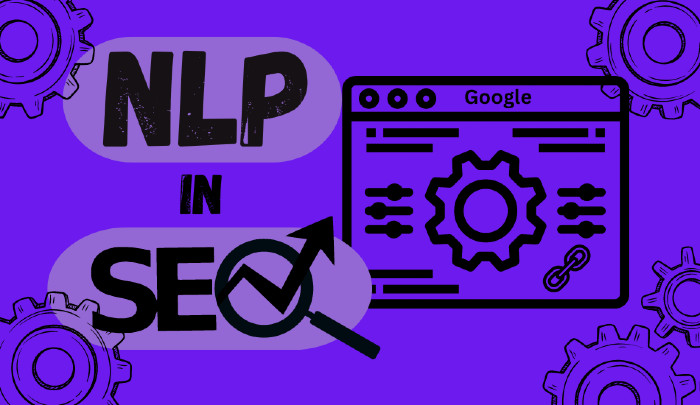
Google’s Use Of Natural Language Processing
Let’s peek behind the digital curtain and understand how Google taps into Natural Language Processing (NLP) to become your website’s language connoisseur. It’s not as complex as it sounds, think of it as Google learning to chat like a human.
Google’s mission? Making your search experience top notch. NLP is their ally in this quest. Instead of just matching keywords, Google aims to comprehend the context and intent behind your queries. It’s like having a search buddy who gets what you really mean.
Utilization of NLP in Understanding Search Queries
Have you ever noticed how your search results are more on point these days? That’s NLP at play. It helps Google understand the nuances in your search queries. So, when you type a question or phrase, Google isn’t guessing, it’s delivering what you actually want.
Machine learning is the backbone of Google’s adaptation. It’s not a rigid set of rules but an evolving system that learns from user interactions. Natural Language Processing is the language whisperer, teaching Google the art of understanding how humans express themselves.
In more simple terms, Google isn’t just a search engine, it’s a conversation partner. It’s not about decoding a cryptic language, it’s about embracing how real people talk. Your website becomes more visible when it speaks Google’s language. Now let’s take a look into some more insights in this NLP in SEO guide.
Relevance Of Sentiment in NLP
Alright folks, let’s dive into the emotional side of the SEO game, sentiment analysis! It’s not just about words anymore, it’s about feelings. Think of it like having a virtual mood ring for your content.
Why does sentiment matter? Well, Google’s NLP isn’t just reading your words, it’s catching the vibes. If your content exudes positivity, answers questions cheerfully, or tackles issues with empathy, Google notices. It’s like a friendly nod from the search giant.
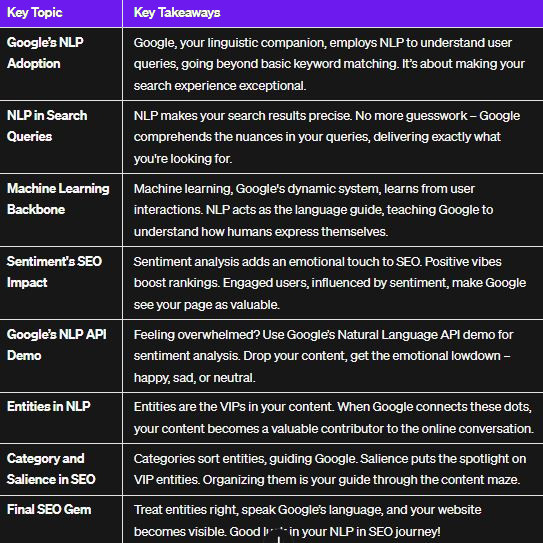
Impact of Sentiment on SEO Rankings
Let’s connect the dots, positive sentiment boosts your SEO rankings. When your content resonates with readers emotionally, it keeps them engaged. And guess what Google loves? Engaged users. The longer they linger, the more Google sees your page as valuable.
Use of Google’s Natural Language API Demo
Feeling a bit overwhelmed? No worries, Google’s got a tool, the Natural Language API demo. It’s like having a sentiment analysis sidekick. Drop your content in and it gives you the emotional lowdown. Happy, sad, neutral, It spills the beans!
In the world of Natural Language Processing, your content isn’t just about info, it’s about building connections. So, the next time you write, infuse a bit of positivity. It’s not just for your readers, it’s for Google to give your website a friendly high-five. Stick with me as we uncover more gems in the NLP treasure chest.
Entity In Natural Language Processing
Okay, let’s talk about entities in the NLP world. No, we’re not diving into sci-fi, we’re just understanding how Google’s NLP grasps the who, what, and where in your content.
Definition of Content Entities
Entities are like the VIPs in your text. These are the essential who, what or where. If you’re chatting about “SEO tactics, “NLP,” or “sitecentre,” these are your entities. Google pays attention to them because they carry weight and relevance.
Imagine Google’s Knowledge Graph as a well organized party, and entities are the star guests. Google connects the dots between entities, creating a web of understanding. When your content hosts these VIPs, it’s like getting an invitation to Google’s exclusive party.
Importance of Category and Salience in SEO Efforts
Categories and salience? Fancy terms, right? Not really. Categories are like sorting your entities into groups, making Google’s job easier. Salience is how prominent an entity is in a sentence, the spotlight on the VIP. By organizing and highlighting your entities, you guide Google through your content maze.
In a nutshell, entities in NLP are your content’s rock stars. When you treat them right, Google sees your content as a valuable contributor to the online conversation. With all this said, I wish you good luck in your endeavors with NLP in SEO!
Now, has this post left you thinking that the research and implementation is just too difficult to accomplish? I would highly recommend looking into alternate marketing strategies to get the job done!
Well, there we are with my NLP in SEO guide! Hope this helped you find some additional inspiration in this roller coaster ride of rankings. Let’s talk about it, leave a comment!
NLP In SEO FAQ’s
What is NLP in SEO?
NLP, or Natural Language Processing, stands as a pivotal element in SEO, revolutionizing how search engines interpret and respond to human language. In simpler terms, it’s like teaching search engines to understand our conversations.
This technological marvel enables search algorithms to grasp the context, intent, and nuances of words used in queries. This enhances the overall relevance of search results. As a result, websites that leverage Natural Language Processing in their content enjoy improved visibility and rankings
How does BERT impact SEO?
BERT, which stands for Bidirectional Encoder Representations from Transformers, has reshaped the SEO landscape. By comprehending the context of words in a sentence, BERT ensures that search results align more closely with the user intent.
This means more accurate and contextually relevant search outcomes, positively impacting SEO rankings. Websites that optimize content to align with BERT’s capabilities are more likely to surface higher in search engine results, attracting relevant traffic.
Why are entities important in SEO?
Entities, within the world of SEO, are like the building blocks of language for search engines. These could be names, places or concepts. By incorporating entities strategically into content, websites provide clearer signals to search engines about their relevance to specific topics.
This in turn, assists search algorithms in delivering more accurate and targeted results, thereby contributing to an enhanced SEO performance.
How can sentiment analysis benefit SEO?
Sentiment analysis, a process that determines the emotional tone of content and plays a crucial role in SEO. Understanding the sentiment of user interactions with your content helps gauge its effectiveness.
Positive sentiment can lead to increased user engagement and longer dwell times, both of which are factors considered by search engines in ranking algorithms. By integrating sentiment analysis into SEO strategies, businesses can tailor their content to evoke positive responses, ultimately improving their SEO impact.

